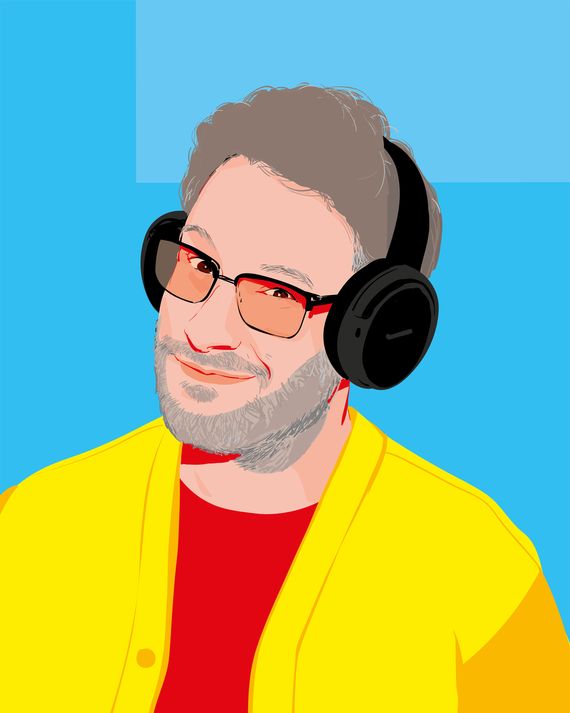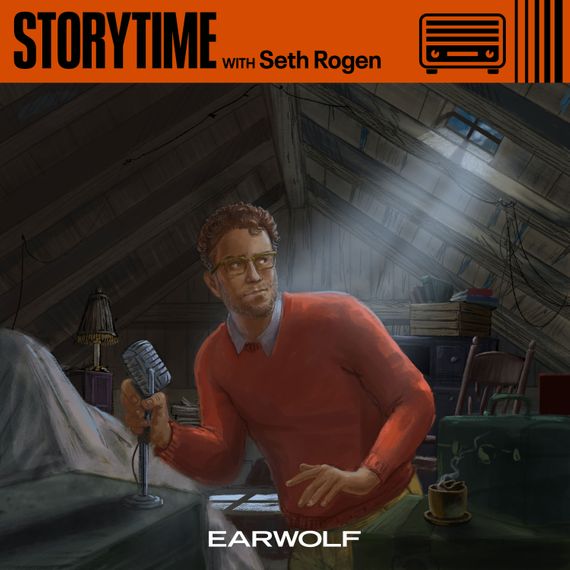
What unites Seth Rogen’s work is a vibe — equal parts soulful, sweet, and stoner. That vibe is present in his latest venture, a new podcast with Stitcher called Storytime With Seth Rogen. The idea, he tells me, is that everybody probably has at least one big crazy story in their lives to talk about; his goal is to render them as cinematically as possible with the help of the creatively bombastic producer Richard Parks III of Richard’s Famous Food Podcast, who deploys quick editing, archival tape, and psychedelic sound loops. Harnessing the rambling curiosity of the weed connoisseur, Rogen takes what could have been straightforward interviews — with both celebrities and regular people — and blows them up into something more unexpected.
How would you describe what you’re trying to do with Storytime?
The most experience I’ve had with this question thus far has been in trying to explain it to the people I’ve asked to be on it, and so I’ve had to come up with something to tell these people what it is they’re participating in. I ask them if they have any incredible stories they think are entertaining or formative, or just something they’ve wanted to tell for a long time, and my pitch is that I will take that story and turn it into a sort of audio documentary. I make it very clear they’re not all funny, and if it’s not a funny story, then I won’t go out of my way to try to add humor to it, you know?
[What I say] is I will try to honor the story and its stakes in your life. That’s something I’m trying to reflect: The story might seem low stakes in the grand scale of the universe, but to the people experiencing them — even if the story is just, like, how you accidentally insulted someone — in your head it could be as though you’re in the midst of Michael Clayton. It’s an exercise in distilled storytelling to me, trying to put the audience in the head of the storyteller and make it as cinematic an experience as possible.
What have you learned about the kinds of stories people choose to tell?
With many of the famous people, I’ve found it is their instinct to tell you how they became famous. Well, maybe not how they became famous, but about the thing that set them on their journey. I understand why that’s a draw — this is a very elusive job and career, and not everyone has the motivation to pursue it seriously. Other times, people talk about messed-up, bad moments in their lives or things they wish they had done differently. Then there are people who don’t quite know why they chose the story they’re telling. It’s just, “I have a strong feeling this is the story I should tell you.” Part of those episodes becomes about me trying to decipher why they made that choice, which is often more revealing than the story itself.
I was struck by the episode with Quinta Brunson, which starts one way and sprawls outward into a larger story about niceness.
It starts with Quinta explaining how at one point, after getting out of a bad relationship, she was going to give up comedy and dedicate herself to being a Jehovah’s Witness. Then one day, on a date with this guy where they’re going to see Inglourious Basterds, she meets Paul Rudd in the theater, whom she’s a huge fan of. He was very nice to her, and she told him about her dream of pursuing comedy; he told her if she was serious about it, she might as well do it. That conversation changes the course of her life. I spoke to Paul for the episode, thinking maybe he’d remember that interaction, but he had no memory of it. He changed her life, and it was a result of him being a nice dude in general.
How did you pick your guests?
A few different ways. Some people I know, and I’m inherently interested in. Some are people I do not know, and have been referred to me by others, because I’ve asked a lot of people I know personally if they knew of anybody in their life who’s always told you this story that they felt should have a larger audience. So, yeah, they come to me through different ways. It’s either people I suspect have a good, interesting story, or it’s someone I’m specifically told has a good, interesting story.
I definitely come from a place where I’ve always been told that mining your personal stories and experience is very valid, and people do respond to that. As uninteresting as you think you might be, if you’re genuinely truthful with your experience, people will find it interesting.
When we wrote Superbad, I was so young. I had none of the baggage of, “Do other people care about this? Is it interesting? Is there better stories to be telling?” It was just, “I’ll just tell my own story.” That was all we knew. It showed that, you know, we were very unremarkable kids, but we were showing our lives in a way that had never been expressed before. So that’s something I’ve always been imploring people. And everyone in my life, I assume, will be on the podcast one day, because I do think everyone has at least one good story. No one has lived their whole life without one interesting thing that happened to them. I’m sure you probably have a few, if you’re really thinking about it. That was something that was instilled into my creative development from a young age, I think.
Why did you want to make this podcast?
Ever since everyone I work with started having kids, I found I always needed some kind of side project to do on my own. The book I wrote [Yearbook, a collection of personal essays] was the first iteration of that. I started writing it around the time that Evan [Goldberg], my creative partner, had his second kid. And when it comes to my writing of screenplays, I truly do not write without Evan. I was just getting antsy, you know?
So I was working on these chapters when I started to realize, I bet everyone has these. I’m not particularly interesting in the grand scale of people. They just haven’t taken the time to write them or don’t know how to contextualize them maybe. It also came from a place of, Can I create entertainment with much less resources than I generally have?
Between Yearbook and the podcast, it feels like you’re doing a lot of looking back with these projects. Do you figure you’re aging into a more retrospective phase in your career?
Probably! I’m not doing anything interesting anymore. I’m just a rich guy living in the Hills who never leaves the house.
There are loads of movies and books about that.
Yeah, but they all suck! [Laughs.] Part of it is just self-awareness that my life is uninteresting now. It is objectively not something I would watch if it was dramatized back to me. I’m also interested in how a lot of people I know are getting to the age where they’re starting to look back and think, What are the events that turned me into the person I am? Once you reach your 40s, you start to feel like you’re finally the person you’re going to be, you know? You’ll always change and evolve, but it’s the first time you start seeing no one knows a lot more than you and that you have as much right to reflect as anybody does.
Did you end up being the person you thought you were going to be?
Oh, it’s so much better. [Laughs.]
When you were in your 20s, who did you think you were going to be in your 40s?
Honesty, I’ve never been someone to project what the future is, because from a young age, things far surpassed any expectations I had. For the last 20 years, it’s just been a constant state of, “Holy shit, this is crazy.” I don’t know where it’ll go, but if we stayed here, I’d be totally fine.



